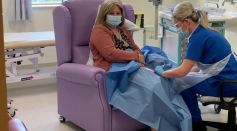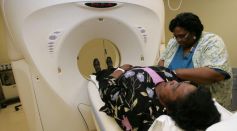Tags: Breast cancer

Women at Higher Risk of Ovarian Cancer Have This Genetic Mutation, Scientists Reveal

Evolution Game Theory Will Help Predict Cancer's Response to Treatments, Control Its Trajectory

Silver Bullet for Cancer Metastasis Found by Princeton Researchers: Disables Gene in Human and Mice Tissue

Health Myths Debunked: Drinking Alcohol Even in Moderation Does Not Promote Long Life

New Breast Cancer Risk Prediction Tool Can Aid in Earlier Diagnosis, Reduced Mortality Among Black Women

Why Is Cancer Care So Expensive? Treatment for the Deadly Disease Costs the US More Than $156 Billion Annually
Early Cancer Detection: Study Shows How An ‘Innovative Microscope Slide’ Can Effectively Determine Diseased Cells

AstraZeneca's Olaparib Pill Reduced Risk of Recurrence in Early Stage, Hard-to-Treat Breast Cancers

5-Minute Breast Cancer Jab: Less Time at Hospitals, Less Possible COVID-19 Exposure
Living Near Artificial Night Lights Increases Risks of Thyroid Cancer

New Report Says Breast Cancer is the Most Diagnosed Cancer Across the Globe
Medical Experts Explain That Immunotherapy Can Treat Some Types of Cancers

Honeybee Venom Can Kill Aggressive Breast Cancer Cells Without Damaging Healthy Cells

Intraoperative Radiotherapy Eyed as Alternative to Conventional Breast Cancer Treatment Techniques

Smokers Are Less Likely to Get Cancer Screening Tests

Breast Cancer Screening Should Start at 40, New Study Suggests
Stretch Marks Could Signal One Of These Two Worrying Medical Conditions

Four-Stranded DNA in Cancer Cells, a Weak Spot That Could Lead to Personalized Treatment
Clean Margins in Cancer Surgery Made Possible by Glowing Dye: Study
Breast Cancer Patients Treated at Early Stage Twice Likely to Die From An Aggressive Form 20 Years Later: Study
Most Popular

Why Stars Twinkle: Flickering Explained by Atmospheric Turbulence and Light Distortion

The Role of Materials Science in Engineering: How Modern Engineering Materials Drive Innovation

Tornadoes vs. Waterspouts vs. Dust Devils: Key Differences and Vortex Types Explained

Climate Adaptation Strategies Explained: How Societies Respond to Climate Change





